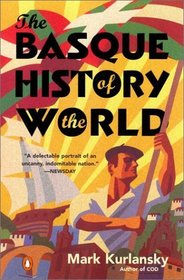David C. (xcom) - , reviewed The Basque History of the World : The Story of a Nation on + 29 more book reviews
Helpful Score: 5
Personally I was not very impressed with this book at all just as I was not impressed with Kurlansky's "Salt". I am very fascinated with the subject matter which is why I eagerly waited on the book. I found the book seemed to do more for stretching out Basque specialties and delights while not highlighting their other qualities such as the land they inhabit. The Basque industrious spirit and skill with enterprise were well discussed but they were narrowed to their place in fisheries, steel, and chocolate.
Most of the book was obviously based upon the Spanish struggle for independence and the ETA movements later in the book but there really wasn't a whole lot of mention of Basques as a people. For a book on a united ethnic group I just found the history; and therefore my interpretation of the Basques, to be very divided.
The writing style also did little to illustrate deep feeling. It seemed rather dry to me for a lot of it. The book wasn't really that bad but it just didn't live up to my expectations I guess. A more gripping account of this very interesting people could have been written.
Most of the book was obviously based upon the Spanish struggle for independence and the ETA movements later in the book but there really wasn't a whole lot of mention of Basques as a people. For a book on a united ethnic group I just found the history; and therefore my interpretation of the Basques, to be very divided.
The writing style also did little to illustrate deep feeling. It seemed rather dry to me for a lot of it. The book wasn't really that bad but it just didn't live up to my expectations I guess. A more gripping account of this very interesting people could have been written.




![header=[] body=[Get a free book credit right now by joining the club and listing 5 books you have and are willing to share with other members!] Help icon](/images/question.gif?v=29befa08)
